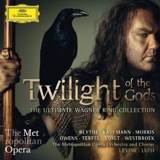|
|
|
|
|
|
|
|
| Classics Today |
| Review by: Robert Levine |
|
|
|
Chunks From a Not-Great Ring |
|
|
 This
new two-CD set contains two hours and 39 minutes of excerpts from the Met’s
highly controversial, $16 million Ring Cycle. Without seeing “Le Machine”,
i.e., the stage machinery and projections that moved and clunked and
misfired and (about 75 percent of the time) worked properly, one can sit and
listen to the singing and playing with impunity and without distractions.
And what we are left with, at least on the basis of these 159 minutes, is
not competitive with the other most impressive and crucial recorded Ring
Cycles, like those by Solti (Decca); Clemens Krauss (various labels—best
Opera d’Oro); Keilberth (Testament); or Barenboim (Teldec). (Yes, I know I’m
giving short shrift to Karajan and Furtwängler; so arrest me—it’s a matter
of taste after a while). This
new two-CD set contains two hours and 39 minutes of excerpts from the Met’s
highly controversial, $16 million Ring Cycle. Without seeing “Le Machine”,
i.e., the stage machinery and projections that moved and clunked and
misfired and (about 75 percent of the time) worked properly, one can sit and
listen to the singing and playing with impunity and without distractions.
And what we are left with, at least on the basis of these 159 minutes, is
not competitive with the other most impressive and crucial recorded Ring
Cycles, like those by Solti (Decca); Clemens Krauss (various labels—best
Opera d’Oro); Keilberth (Testament); or Barenboim (Teldec). (Yes, I know I’m
giving short shrift to Karajan and Furtwängler; so arrest me—it’s a matter
of taste after a while).
The conductors here are James Levine for the
first two operas, and then, after his disappearance (which remains to this
day), Fabio Luisi. The former is notably grand and expansive, with broad
tempos (though not as broad in Walküre as in seasons past, as recorded by DG
on both CD and video); the latter is more transparent and energetic. Both
are valid and, in short, superb, particularly judging from these “bleeding
chunks”.
The vocal and dramatic standouts are the imperious
Stephanie Blythe as Fricka—but we only get about three minutes of her
Walküre scene and little of her in Rheingold; Eric Owens’ magnificent,
larger-than-life, nasty Alberich; Jonas Kaufmann’s manly, beautifully sung
Siegmund; Hans-Peter König’s cruel-sounding, insinuating Hagen; and Bryn
Terfel’s fine, intelligently phrased, sensitive Wotan, more impressive here
than live in the house. Second-tier impressive are Patricia Bardon
as Erda and Gerhard Siegel as Mime (not enough of it, but marvelous in the
Forging Song).
Sadly, the weakest singing comes from our Siegfried
and Brünnhilde, Jay Hunter Morris and Deborah Voigt, respectively. He is
simply not a Heldentenor; the voice is too slim. He does what he can and his
sound is a true tenor and not at all unappealing; but lacking breadth and
power, he cannot be seen as a very good Siegfried. Voigt varies: she’s at
her best, oddly, in Götterdämmerung, and is good enough in Walküre,
particularly near the end. But her every moment in Siegfried is painful and
embarrassing to hear—she sounds like a desperate, elderly woman, and her
final high C is a scream. Not only that, but throughout the voice is just
not majestic enough for the part; the sound itself is wrong. She tries hard
and does not succeed.
Other than an apparently still available 2-CD
set from Philips (The Best of The Ring), I cannot think of another
compilation of inexpensive highlights, and so if you wish to gain some
familiarity with The Cycle but don’t care to take a $100.00 plunge, this is
what you’ll have to buy. It does give a fine idea of what the Cycle
contains, with many of the truly major moments, but of course, it is for the
uninitiated. All it needed was a strongly-cast soprano and tenor, and that
did not happen. At the price offered, it does its job, but it doesn’t win
any prizes. |
|
|
|
|
|
|
|
|
|
|
|
|
|
|
|
|
|
|